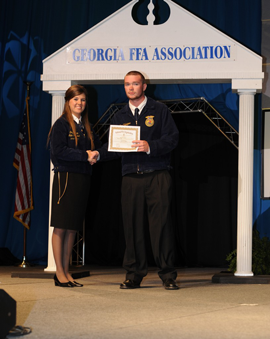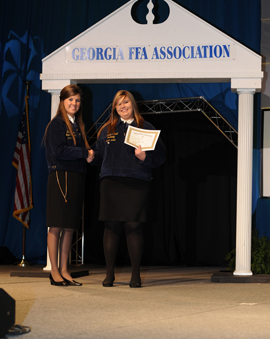

Recipients of the State FFA Degree were recognized at the 85th State FFA Convention held at the Macon Centreplex on April 25-27, 2013. The State FFA Degree is the highest degree that the Georgia FFA Association can bestow upon its members. Georgia was proud to award over 700 State Degrees to deserving FFA members.
In order to receive the State FFA Degree, members must meet several requirements outlined by the National FFA Organization. Students must have been enrolled in an agricultural education classroom and been an active FFA member for at least two years. Recipients must already hold their Chapter FFA Degree prior to receiving the State Degree, actively participate in the planning and implanting of the chapter’s Program of Activities, and participate in at least five different activities above the chapter level.
Creating the leaders of tomorrow is a vital part of the mission of the FFA. Therefore, members receiving their State Degree must demonstrate leadership through performing 10 parliamentary law procedures, giving a six minute speech on agriculture, and serving as an FFA officer, committee chairperson, or committee member. Members must also have a satisfactory academic record, and complete at least 25 hours of community service in a minimum of two different service activities.
Students in FFA begin creating Supervised Agricultural Experiences early in their FFA career and continue working on them throughout their involvement in agricultural education. FFA members receiving their State Degree must show a record of having a satisfactory SAE. Members must have earned and productively invested at least $1,000 or have worked at least 300 hours outside of scheduled class time.
The Georgia FFA Association was proud to bestow the State FFA Degree onstage to each deserving FFA member.
There are more than 500,000 FFA members nationwide. The Georgia Association has more than 32,000 members, making it the third largest Association in the nation. The FFA makes a positive difference in the lives of students by developing their potential for premier leadership, personal growth, and career success, through agricultural education.

